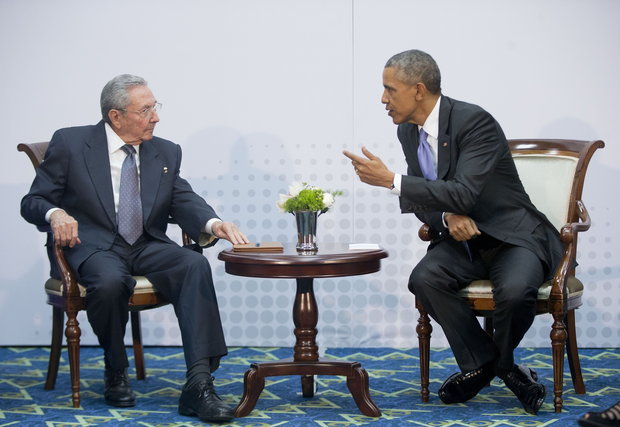
State higher education board blocks opening for university research trips
For 10 years, a controversial Florida law has forbidden faculty and students at public universities from using any type of funds to travel to Cuba or other U.S.-labeled state sponsors of terrorism.
Now that President Barack Obama plans to remove Cuba from the list of state sponsors of terrorism, Florida International University and other public colleges might seem eager to resume research trips to the island.
Such is not the case — with state higher education officials blocking the way.
The Florida Board of Governors recently advised FIU that the state’s educational travel ban won’t be completely lifted until the United States renews diplomatic relations with Cuba — which is still up in the air.
“In addition to being removed from the list, the United States also has to establish diplomatic relations with Cuba before faculty or students can engage in scholarly activities in Cuba,” the board’s communications director wrote to her counterpart at FIU in a recent email.
“Once diplomatic relations are restored, any requests to conduct scholarly activities located in Cuba will follow the normal processes for university approval,” the board’s spokeswoman, Brittany Davis, wrote FIU’s media relations director, Maydel Santana-Bravo.
Davis told the Miami Herald on Wednesday that general counsel Vikki Shirley of the Florida Board of Governors — a 17-member body largely appointed by Gov. Rick Scott — provided the legal analysis sent to FIU. No vote on the issue was taken by the board. To back up the analysis, Davis cited a 1996 state law that says any entity receiving state funds “may not travel to or do business with any country located in the Western Hemisphere which lacks diplomatic relations with the United States.”
FIU — whose faculty Senate unsuccessfully sued the state to overturn the travel ban on the use of public and private funds for research trips to Cuba — told the Herald that the west Miami-Dade school will follow the lead of the board of governors until U.S. relations are normalized with Raúl Castro’s government.
“FIU is following the direction of the board of governors and Florida state law,” Santana-Bravo said Wednesday.
A careful review of the “Travel to Terrorist States Act,” passed by the Florida Legislature in 2006, shows that there is no mention about diplomatic relations having to be normalized with the communist country. Adding to the confusion: the previous 1996 law cited by the board of governors did not stop FIU faculty or other university professors from traveling to Cuba for research when the country had no diplomatic relations with the United States.
A former chairman of the FIU Faculty Senate, who was a plaintiff in the lawsuit challenging the state law, condemned the board of governors’ position.
“I think this is an overreach,” said Thomas Breslin, FIU professor of politics and international relations. “It’s an inexplicable position taken by the general counsel for the board of governors.”
Breslin, who is still a member of the faculty Senate, said he will bring up this matter as new business, saying he was “puzzled” as to why the board of governors would want to continue closing the door on university research trips to Cuba. He noted that Cuba programs at FIU and the University of Florida have been “hurt” by the travel ban.
“The board of governors should be applauding this opportunity,” Breslin said. “Instead, they are continuing the obstructionist policy of the state Legislature from 10 years ago.”
The ACLU, which had sued the state on behalf of the FIU Faculty Senate and other university professors in Miami federal court, said that the board of governors has imposed a “barrier” to resuming lawful research trips to Cuba by creating a new wrinkle in the law that it has no power to make.
“This is a political opinion, not a legal one,” said Howard Simon, executive director of ACLU’s Florida chapter. “Now the Board of Governors and FIU have created a barrier to academic research where none existed before.
“You would think that one of a university’s highest responsibilities is to defend the First Amendment and the academic freedom of its own faculty members to engage in research and publish that research,” Simon added.
The University of Miami, a private institution that was not affected by the state travel ban, has continued to sponsor faculty trips to Cuba for educational research over the past decade, according to UM spokeswoman Margot Winick. As school policy, however, students have not been allowed to go on those trips because the U.S. government has no embassy in or relations with Havana, she said.
Politically, the state travel ban pitted public university professors who sought to regain academic freedom against Miami’s hardline Cuban-American politicians who wanted to tighten the screws on former Cuban leader Fidel Castro. For all practical purposes, the economic benefit to Cuba was minuscule. Before the travel ban took effect in 2006, FIU’s Cuban Research Institute spent $125,511 on direct travel expenses to and from Cuba, according to court records.
Legally, Florida’s travel ban — the only state law of its kind in the country — faced heavy scrutiny in federal courts over the past decade. The main question hinged on whether federal law trumped state law under the Constitution regarding U.S. foreign policy toward Cuba.
In 2012, the U.S. Supreme Court let stand a lower court ruling that barred public colleges and universities from using state and private money for travel to countries such as Cuba, Iran, Sudan, Syria and other nations considered sponsors of terrorism. Cuba was placed on the U.S. terrorist list in 1982 because of its efforts to promote armed revolution in Latin America.
(From: Bradenton Herald)


